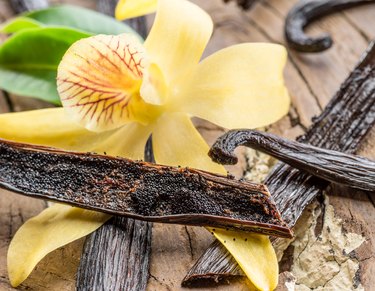Besides ground vanilla beans, also referred to as vanilla powder, we also have a wide range of vanilla beans and vanilla gifts available.

What is vanilla powder?
Vanilla powder is ground up vanilla beans – that’s it.
The beans are dried completely and then ground down into a fine powder. Vanilla powder is not the same thing as vanilla sugar. Many products on the market claiming to be vanilla powder are in fact vanilla-flavoured sugar. These white-beige powdery substances are actually vanilla-infused maltodextrin, dextrose or finely ground sucrose. So be careful about what you buy!
While vanilla sugar is a great flavour enhancer, it’s not vanilla powder. Vanilla sugar can be used as a substitute for regular sugar in baking and cooking, and can even be used to sweeten your morning coffee. But it can’t be used in the same way or with the same levels of success.
You might like: Extract Vanilla Beans
Pure ground vanilla powder is more pricey than vanilla sugar because it’s made from pure vanilla pods, with no artificial or additional ingredients added. Vanilla powder should be dark brown since the entire bean is used.
Vanilla bean powder can also be made from spent vanilla beans which are also referred to as exhausted or expended beans. These beans are the ‘leftovers’ from the vanilla extract process, being sifted out of the vanilla extract liquid. These seeds have no vanilla flavour and purely offer aesthetic value. This is something to remember with all vanilla products, especially those that are marketed as being more ‘healthy’ or ‘natural’ because of the small black vanilla specks.
Vanilla powder gives a really concentrated flavour, so if you’re substituting powder for beans, extract or paste in recipes, use ½ teaspoon of ground powder for 1 bean, or ½ teaspoon of ground powder for every teaspoon of extract or paste. 1oz of powder equals roughly 11 grade B vanilla beans.
Vanilla Paste and Vanilla Powder
About a month back, I went over to a friend’s house for their kid’s birthday party. They had a great spread, for parents and kids alike, including everyone’s perennial favourite – cookies, fresh out the oven.
They looked delicious. Massive chocolate chips in a still-warm, super-soft dough. But when I bit into one, I was incredibly disappointed. Something was missing that I couldn’t quite put my finger on it.
It turns out that my friend had used a cheap brand of “vanilla powder” to make the cookies. The so-called powder was nothing more than vanilla-flavoured sugar, using clever marketing to masquerade as vanilla powder.
It’s okay. All was not lost. I took a quick drive home to collect some of my Native Vanilla ingredients and returned to her to make Chef Stephan Colluci’s Vanilla Cake with her.
While it was in the oven, we had a long chat about the French and Italian food philosophy – that quality food doesn’t need to be complicated to achieve incredible flavour, it just needs quality ingredients.
In my mind, there is no substitute for real, high-quality vanilla. And she was equally convinced when she smelled the cake fresh out of the oven, and especially after her first bite.
If you’re a baker, you’ll go through massive amounts of eggs and flour. But then you’ll cheap-out on the real star of the show. A single bottle of vanilla extract can stay in your cupboard for weeks, if not months. That’s why I think that buying vanilla extract is like buying a good extra virgin olive oil. I’m happy to pay the higher price as an investment in my food because the quality makes everything I cook with it that much better.
It’s the pure, natural flavour of vanilla. Pungent, rich and not watered-down.
And Native Vanilla is even better because I know that I’m supporting an ethical company who makes responsible choices, both on an environmental and humane level.
We chatted about all of this and more.
She had a couple of other questions for me about vanilla powder and vanilla paste. And it seems like other people want to know the answers. So here they are, for your reading pleasure.
Vanilla Drying Process
FAQ
Can you use powdered vanilla instead of vanilla extract?
What’s the difference between vanilla and vanilla powder?
Is powdered vanilla better than liquid?
What is vanilla powder?
Also known as vanilla bean powder and ground vanilla, vanilla powder is essentially whole vanilla beans that have been dried and processed into a powder. The ingredient might seem elusive at first, but with some practice and creativity, it could be just what you need to add warmth and flavor to baked goods and desserts.
What is the healthier substitute of vanilla extract?
To make the extract vanilla, beans are soaked in alcohol to extract its enticing flavor and aroma. The best substitutes of vanilla extract are maple syrup famous for its sweet aroma, almond extract for its nutty flavor, brandy or rum, a pinch of cinnamon or cardamom or nutmeg, instant coffee, zesting a lemon or orange at the end of baking. These are some of the best substitutes to complete your dish in the absence of vanilla.
Where does vanilla come from?
Vanilla originally comes from Mexico, where hummingbirds and bees have adapted to be able to penetrate and pollinate its flower. But when Europeans first brought vanilla plants back home with them, and without the help of the native birds and bees, they couldn’t figure out how to pollinate the flowers to grow beans.
What makes vanilla so special?
But its usefulness is not limited to dessert. Vanilla has its own character, and it serves as a valuable flavor lifter. It can soften sharp flavors and invigorate earthy ones. If you’ve ever wondered what makes vanilla so special, or how you can get the most from the vanilla you buy, we have answers for you!
